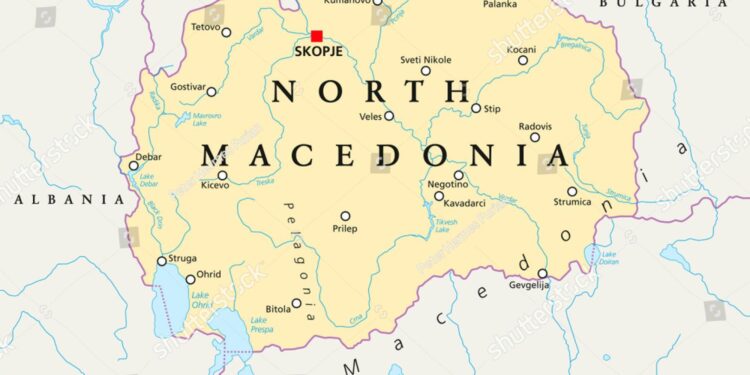The political and social turmoil gripping North Macedonia shows no sign of abating, as the Balkan nation faces a deepening crisis that threatens its stability and progress. From contentious government disputes to rising public unrest, the situation reflects longstanding challenges rooted in ethnic tensions, governance issues, and economic struggles. This article examines the multifaceted nature of North Macedonia’s crisis, exploring the underlying causes and the potential implications for the country and the wider region.
Political Instability and Ethnic Tensions Threaten National Unity
The fragile fabric of North Macedonia’s nationhood is being tested as longstanding ethnic divisions deepen, sparking fears of escalating unrest. Political maneuvering between Macedonian and Albanian factions has intensified, with key parties struggling to reach consensus on issues ranging from language rights to public administration reforms. This deadlock undermines governance and fuels public disillusionment, creating a volatile atmosphere where trust in democratic institutions steadily erodes.
Key factors exacerbating the crisis include:
- Disputes over constitutional amendments aimed at addressing minority rights.
- Increased rhetoric from nationalist groups on both sides.
- Regional interference amplifying internal tensions.
- Economic stagnation contributing to social frustration.
| Community | Population % | Main Concern |
|---|---|---|
| Macedonian | 64% | Preservation of national identity |
| Albanian | 25% | Greater political representation |
| Others | 11% | Inclusive governance |
Economic Challenges Exacerbate Public Discontent and Social Unrest
North Macedonia’s economic landscape remains fraught with challenges that are fueling growing public frustration. Persistent inflation rates, coupled with rising unemployment, have disproportionately impacted vulnerable populations. Citizens face increasing costs of living while wages remain stagnant, creating a widening gap that threatens social cohesion. The looming energy crisis further exacerbates these pressures, with households and businesses grappling with soaring utility bills. Such economic hardships have destabilized confidence in governmental institutions and amplified demands for transparency and reform.
Key economic stressors include:
- Rising Inflation: Consumer prices have surged by over 8% in the past year.
- Unemployment Spike: Youth unemployment rates hover above 30%, limiting future prospects.
- Energy Shortages: Inconsistent supply and high costs strain industries and households alike.
- Currency Fluctuations: The Macedonian denar has experienced increased volatility, affecting trade and savings.
| Indicator | Current Value | 12-Month Change |
|---|---|---|
| Inflation Rate | 8.2% | +3.4% |
| Youth Unemployment | 31.5% | +5.1% |
| Average Energy Prices | ‚ā¨0.12/kWh | +20% |
| Denar Exchange Rate | 56.9 MKD/EUR | ¬Ī0.8% |
International Mediation Urged to Foster Dialogue and Sustainable Solutions
Amid mounting political tensions, calls for neutral third-party mediation have gained momentum as a pivotal step toward resolving the entrenched crisis in North Macedonia. Observers emphasize that only through constructive dialogue under impartial guidance can the nation hope to bridge polarized divides and chart a course toward stability. The involvement of international mediators is viewed as crucial in facilitating conversations that transcend domestic partisanship, ensuring that all ethnic and political factions feel represented and heard.
Key areas where mediation is expected to make an impact include:
- Ethnic minority rights and representation
- Reforming electoral and administrative institutions
- Addressing concerns over media freedom and judicial independence
| Stakeholder | Primary Concern | Mediation Focus Area | |||
|---|---|---|---|---|---|
| Government | Maintaining political control | Electoral reform | |||
| Opposition | Ensuring fair media access | Media freedom | |||
| Ethnic Minorities | Political inclusion | | Stakeholder | Primary Concern | Mediation Focus Area | |
| Government | Maintaining political control | Electoral reform | |||
| Opposition | Ensuring fair media access | Media freedom | |||
| Ethnic Minorities | Political inclusion | Minority rights and representation |
—
### Summary
As North Macedonia faces escalating political tensions, the push for neutral third-party mediation aims to foster an environment conducive to open dialogue. Mediation efforts are expected to focus on critical areas including electoral reforms, media freedom, and the political inclusion of ethnic minorities. Stakeholders such as the government, opposition, and ethnic minority groups each have distinct concerns that mediation seeks to address, thereby encouraging inclusive participation and long-term stability. The involvement of impartial international mediators is viewed as a vital element to overcoming partisan divides and ensuring equitable representation for all parties involved.
The Way Forward
As North Macedonia grapples with entrenched political and social challenges, the path to stability remains uncertain. The deep-rooted crisis highlighted by Al Jazeera underscores the urgent need for comprehensive reforms and dialogue among all stakeholders. How the country navigates these turbulent times will have significant implications not only for its own future but also for the broader Balkan region.
















